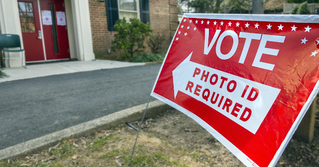
The Battle to be Heard: Native American Rights Fund
A post from the Native American Rights Fund, an organization providing specialized legal assistance to Native American tribes, organization, and individuals nationwide for over 50 years.
The civil unrest of 2020 has emboldened Charity Navigator’s commitment to promoting a more equitable social sector by encouraging both organizations and donors to consider aspects of Diversity, Equity, and Inclusion (DEI) in their decision-making.
Our multifaceted approach includes evolving our ratings to assess key measures of equity, generating Hot Topics to help you Give with Confidence to organizations that are founded by diverse leaders who are dedicated to bridging inequities, and partnering with leading foundations to better tell the story of the unmet and often misunderstood needs that uniquely impact underserved communities.
Last year, the nation was focused on voting and election integrity. A dramatic election, during a worldwide pandemic, raised a host of novel issues. We also know from history that civil rights often come under threat during times of crisis. The most vulnerable populations being the first to suffer. For all of these reasons, we at the Native American Rights Fund (NARF) were especially focused on protecting Native voting rights during the 2020 elections. However, fighting for Native enfranchisement and equity is in no way new. Native peoples have always faced obstacles to participating in non-tribal politics. NARF is committed to making sure their voices are heard.
What the Native American Rights Fund does
NARF is a 501(c)3, Native-led, legal organization that fights to protect Native American rights, resources, and lifeways through litigation, legal advocacy, and expertise. With fifty years of serving Indian Country and Native peoples, we have a long history of holding governments accountable and working towards that mission.
In 2020, NARF released the report Obstacles at Every Turn: Barriers to Political Participation Faced by Native American Voters. Based on the testimony of over 120 witnesses at nine public hearings, the report details how Native Americans are systemically and culturally kept from participating in the non-tribal political process. Barriers such as geographic isolation, distance from and limited hours for non-tribal government offices, lack of traditional mailing addresses, inadequate roads, lack of resources, technological barriers, lack of pre-election information, unequal access to polling places, and outright discrimination against Native Americans are a part of the United States’ legacy of genocide and racism against the indigenous peoples of this land.
Even after the Indian Citizenship Act (1924), many states found reasons to deny the Native vote—residing on reservations, tribal enrollment, and taxation policy were all given as reasons for rejecting Native citizens’ rights. Utah, the last state to remove its laws restricting the Native vote, did so in 1962. Even after the 1965 Voting Rights Act (VRA) outlawed these types of exclusionary practices, they continued in practice. In response, NARF has worked on behalf of Native voters for decades.
For example, in some parts of Alaska, the majority of households primarily speak an indigenous language. The VRA requires language assistance for these voters. Without accurate translations and assistance, the right to vote becomes meaningless. However, it took Alaska Natives and tribes—represented by NARF—repeatedly suing the state to obtain these essential resources for Alaska Native voters. This reluctance to provide language assistance to Native constituents is at odds with the fundamentals of our democratic ideals.
And, for Native communities, systemic obstacles often compound. In North Dakota, inadequate or lacking street addresses on reservations combined with distant DMVs, lack of transportation, and poverty, make it nearly impossible to obtain an ID with a street address. The state’s Native voters were more than twice as likely as non-Natives to lack an ID with a residential address. So, when the state legislature decided to require residential addresses on voter ID, it immediately disenfranchised thousands of eligible voters—most Native. Even after the law was found discriminatory, it was years before the state agreed to provide access to Native voters.
Unfortunately, as with many things, the pandemic made existing disparities worse. States and counties curtailed polling locations and limited services, especially in and near Native communities. States removed in-person voting on reservations that had no home mail delivery, but kept those in-person voting for non-Native communities. Voting registration became more difficult. Ballot witness requirements increased risk, especially for Native communities at a higher risk of dying from COVID-19. Meanwhile, states restricted ballot collection, an essential voting tool for isolated Native communities and individuals, especially elders. NARF was fully engaged, successfully countering each of these challenges.
The 2020 election is over now, and the pandemic hopefully will be under control soon. Attention is waning, but the struggle to protect our democracy and voter access will continue. NARF is committed to representing the interests of Native voters in this process. We know that these problems are not unsolvable. Progress is being made. Governments are being held accountable, and Native voters and candidates are making headway, even in a year like 2020.
If you believe that the first people on the land should not be the last to vote, you can help support these efforts. Donate to support NARF’s ongoing work to protect Native rights. Advocate for legislation that protects Native voting rights. Learn more about actions that you can take.
Native voices must be included in the political process. The health and well-being of our democracy depend on it.
Written by John E. Echohawk (Pawnee), Executive Director, Native American Rights Fund (NARF).


